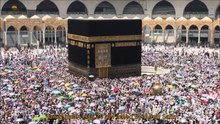Tawāf
Tawāf ( Arabic طواف, DMG Ṭawāf ) is the seven times orbit around the Kaaba in Mecca . It usually takes place as part of the Hajj or the Umra , but can also be performed separately as part of a longer stay in Mecca. It is only valid if the person concerned is in a state of ritual purity . The tawāf is started on the black stone and performed in a counterclockwise direction. The first three circles should be covered in a running step ( ramal ), with each passing the black stone should be kissed or touched or, if this is not possible because of the crowd, one should stretch out one's hand in its direction. At the end of the circling a prayer with two rakʿa s is to be said.
history
In pre-Islamic times, the Kaaba was often carried out naked . In sura 7:31 this behavior is said to have been forbidden to the followers of the prophet Mohammed .
Even in early Islamic times there was a custom of having women who were to be married and slaves who were to be sold, unveiled in full jewelry, perform the tawāf in order to give potential prospective buyers the opportunity to meet the women concerned consider. Umar ibn al-Chattab is said to have advocated the sale of female slaves in this way. At the beginning of the 8th century, the Meccan legal scholar ʿAtāʾ ibn Rabāh is said to have rejected this type of show tawāf for free women. Also around this time the Umayyad governor Chālid al-Qasrī introduced a separation of the sexes in the Tawaf. In the time of the Abbasid caliph al-Ma'mun (813-833), a special time was reserved for the tawāf of women every day after the afternoon prayer. The aim of these rules was to give greater dignity to the sacred district of Mecca and to make the tawāf a ceremony of greater seriousness.
A similar tendency can be seen in the question of vocal utterances. While it is known from traditions from the early Islamic period that people were still singing or reciting poems during the tawāf, in the course of time the view has gained acceptance that one should be silent during the tawāf or that speaking should be limited to "good speech".
It is narrated from the Abbasid caliph al-Mansūr and various pious scholars such as Sufyān ibn ʿUyaina (d. 814) that Chidr appeared to them while they were performing the Tawāf .
Individual evidence
- ↑ See Watt / Welch 333f.
- ↑ Cf. Julius Welhausen: Remains of the Arab sanctuary . Berlin 1897. p. 110.
- ↑ Cf. the traditions relating to 7:31 in the Qur'an commentary by aṭ-Ṭabarī.
- ↑ See Kister 25f.
- ↑ See Kister 23f.
- ↑ See Kister 18–23.
- ↑ Cf. Patrick Franke: Encounter with Khidr. Source studies on the imaginary in traditional Islam. Beirut / Stuttgart 2000. p. 118.
literature
- F. Buhl: Art. Ṭawāf , in: Encyclopaedia of Islam , 2. A., Vol. 10 (2000), 376.
- MJ Kister: "On 'concessions' and conduct: A study on early ḥadīth " in Ders .: Society and Religion from Jāhiliyya to Islam . Aldershot 1990. No. XIII.
- W. Montgomery Watt; Alford T. Welch: Islam I. Mohammed and the early days, Islamic law, religious life. Stuttgart 1980.

